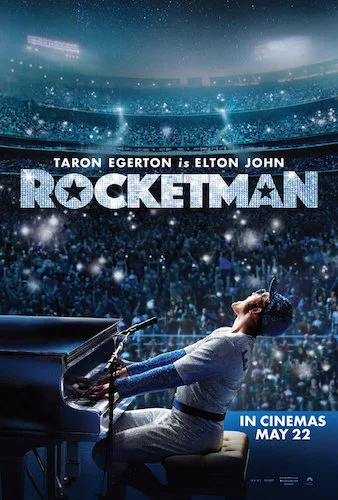Rocketman
Rocketman is a peculiar risk, in the sense that it assumes smushing two non-risk genres together will make something happen. These are the by-the-numbers biopic, and the self aware musical. In an almost bizarre way, it's as if incorporating both safe havens has turned the flaws of the other genre into a positive. For example, many basic biopics skim over details just to include them. Here, they are like lyrics of a song number (which, when utilized properly, tell a story). On the other hand, self aware musicals usually just feel like detachments or prolonged numbers for aesthetic reasons. Here, we are witnessing Elton John's own personal song book. It all works, because it's from his perspective.
That's why the songs being featured at chronologically incorrect times make sense. “Candle in the Wind” was obviously a tribute to the passing of Marilyn Monroe, but here it is used as a snippet of how well a young John (or Reginald Kenneth Dwight, as he once were) could compose a melody. All of this is told by a worn down Elton John in rehab. His songs mean something different to him, in the same way they might mean something different to you or me. This is especially true, since the lyrics were famously written by Bernie Taupin (who is featured prominently here), so John's personal attachments were from a different perspective to begin with.
Rocketman is definitely a straightforward biopic, but it embraces its large history in a short duration by focusing on the blurs that addictions and the rockstar lifestyle can create. It also focuses on the little facts that matter. When John first takes America by storm, the film makes it a priority to emphasize how quickly all of this is going, much to John's chagrin. Rocketman glosses over a lot, but it makes sure to punctuate the moments that matter, assuring us that we are seeing the parts that are necessary to this story of personal sabotage.
A younger, shyer Elton John getting studio time.
Director Dexter Fletcher (who helped finish directing last year’s Bohemian Rhapsody once Bryan Singer was fired) encourages all of the spectacles (sights to behond, and sunglasses) that an Elton John musical would require, by turning this cinematic memoir into an album. Everything that happens in a fantastical way also makes sense outside of the dreamlike context. When John and the audience begin to float during an early take of “Crocodile Rock”, it's clearly the slowing down of a jumping crowd and John's signature leap. However, the weightlessness instills the sensation of a major breakthrough happening, and resonating in the mind of a budding artist finally being recognized. It isn't arbitrary.
Taron Egerton does a strong job as Elton John, especially when it comes to doing his own singing and dancing. When the camera is at a far enough distance, you can almost swear that you are witnessing Elton Hercules John himself. Then there is Jamie Bell as Taupin, who turns in a reserved, yet heavy, performance. Both actors steal every scene, as they command every part of the set, or they allow the extras to come to them. This is a great dynamic, and it's one that brings their creative partnership to a new light.
What I also like is how the film does focus on John's many explorations and addictions, yet it also doesn't feel like this is all the film is about. Each moment is loud enough, and the notions resonate throughout the subsequent scenes. We know now that John has addiction problems, so when he faces his family in any capacity, we know it may be an additional burden that he is carrying during these scenes. Our noses are never rubbed in it. Well, outside of that insane psychedelic drug orgy scene, but that works as a visual rock bottom extremely well.
Elton John well into his rockstar years.
Rocketman is a fun musical, but also a sad (yet conventional) story. I love how it still works in interptetarional elements without disguising anything as absolute truth. One such moment is Taupin delivering John "Your Song" at the family kitchen table (as was apparently the case in reality). The artistic liberty taken was to make this song an ode of appreciation from Taupin to John, to say thanks for working with him. This is not the case in real life, but it works so well here. The speed at which John creates a melody to this song, as if the reciprocation is a mutual respect, creates an incredibly moving moment. It's actually one of my favourite sequences of 2019 so far, and it's a fabrication. Yet, remember: this is a recollection from a suffering John in rehab. This song takes on a new life, and so it does for us, too. Rocketman acknowledges it is safe in a number of ways, so it takes some leaps where it counts, and each attempt pushes the film into a better spot than it may have been if it were more timid.
Andreas Babiolakis has a Masters degree in Film and Photography Preservation and Collections management from Ryerson University, as well as a Bachelors degree in Cinema Studies from York University. His favourite times of year are the Criterion Collection flash sales and the annual Toronto International Film Festival.






